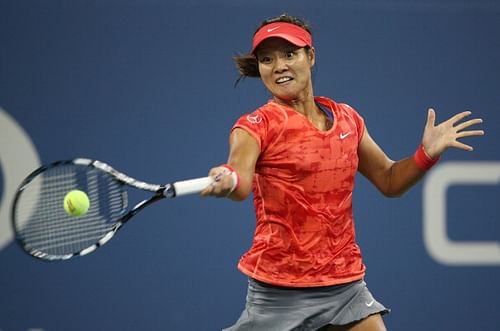
US Open 2013: Li Na slams drugs talk with straight sets win
Li Na marched on at the US Open with a 6-3, 6-0 win over ninth seed Jelena Jankovic to reach the quarter-finals and match her best ever performance at Flushing Meadows. Too bad the conversation has focused on everything other than the tennis in recent days. But as every tabloid journalist knows, never let the truth get in the way of a good story.

Li Na of China plays a forehand against Jelena Jankovic of Serbia during the third round match on Day Seven of the 2013 US Open at USTA Billie Jean King National Tennis Center on September 1, 2013 in the Flushing neighborhood of the Queens borough of New York City. (Photo by Clive Brunskill/Getty Images)
Language can be a powerful thing, as Chinese tennis star Li Na found out to her cost last week.
Normally, it’s Li’s own mouth that gets her into trouble, whether she’s berating journalists for asking inane questions or dismissing her presumed responsibility for representing the entire Chinese population.
But this time, it was someone else’s words. Brook Larmer, an American journalist who has previously turned his attentions to Yao Ming and the rising stars of Chinese golf, penned a lengthy profile of Li in The New York Times ahead of the ongoing US Open. In it, he described how, in 2002, Li’s coach wanted her to take “steroid pills,” to which Li was allergic.
Steroids aren’t illegal in themselves, but, used in a sporting context and without further clarification, people would naturally assume that these steroids were of the anabolic variety, which are all banned by the World Anti-Doping Agency. That’s exactly the conclusion that sections of the Chinese media jumped to following the piece, before taking another leap and claiming that Li took testosterone.
The truth was that Larmer had mistranslated the phrase for “hormone medication” – The New York Times was forced to issue an apology – and Chinese media then misconstrued the already erroneous translation. The reason for the medicine, Li says, was menstrual issues she had prior to the 2002 Asian Games.
Larmer, The New York Times and Chinese media all share part of the blame for a non-story that was hyped into something sensational: Larmer should have used the word “steroid” with more care, not to mention the mistranslation; The New York Times should have fact-checked the story, and Chinese media, whose collective relationship with Li has often been strained, should have restrained themselves.
But here’s the thing: the original source for the “story” was Li’s own autobiography Fighting Alone. If she had indeed taken an illegal substance, would she really have written about it in her book? Common sense could have avoided an awful lot of irrelevant column inches.
Meanwhile, the next wave of Chinese players are making encouraging progress. Duan Yingying made her Grand Slam singles debut in New York after coming through the qualifying tournament. A first-round loss to 6th seed Caroline Wozniacki may not seem like much, but it’s another milestone after Zhang Yuxuan made her Grand Slam singles debut at this year’s Australian Open. But why talk about that when there’s a made-up drugs scandal to hype?